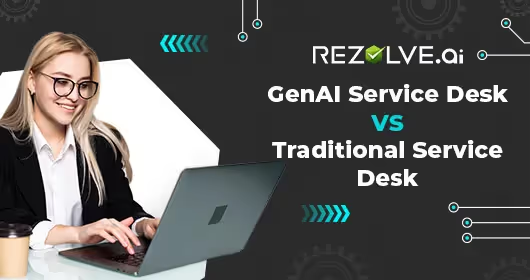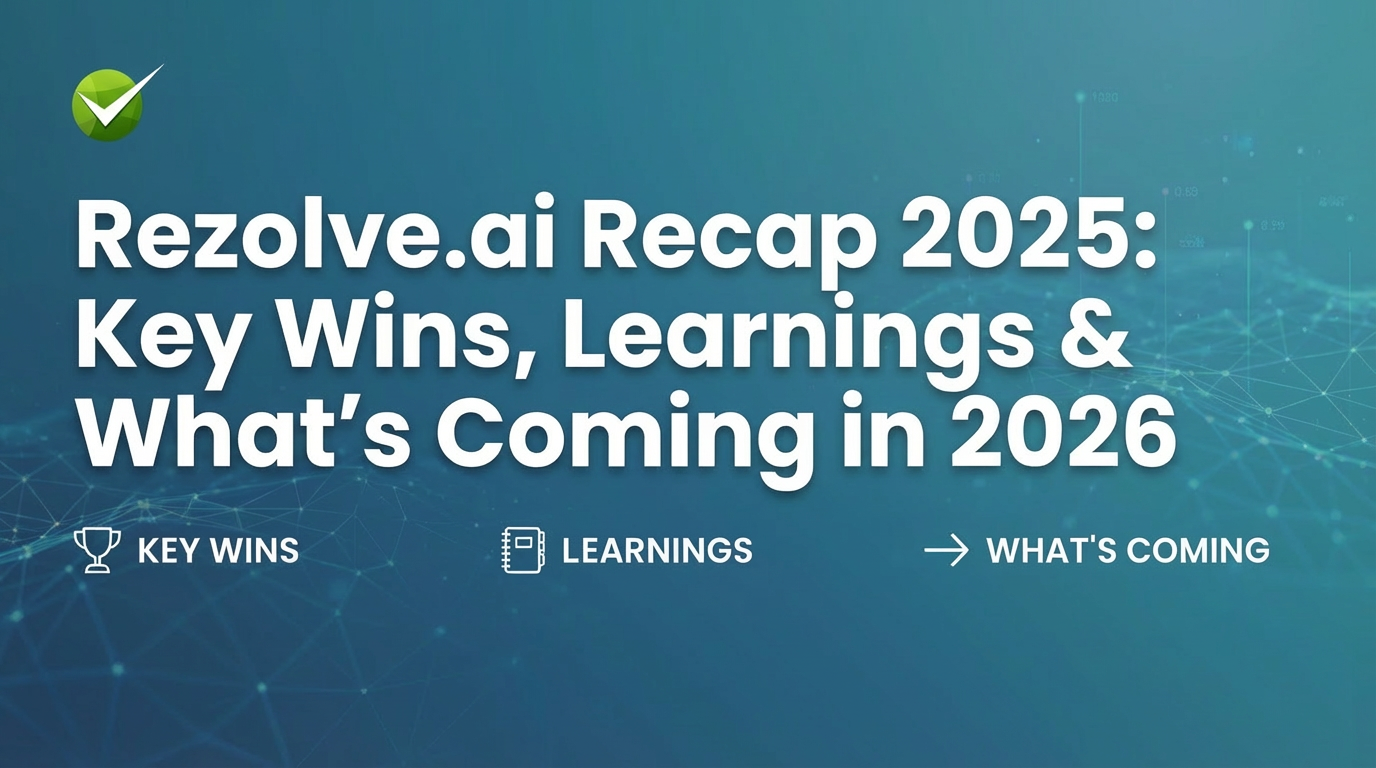GenAI is all the rage, and for good reasons. It is disrupting everything - from service desk operations to business decisions.
In today's tech-driven world, businesses constantly seek ways to optimize efficiency and deliver better service. One area ripe for improvement is the IT Service Management (ITSM) sector, particularly in how service desks handle IT tickets. The dawn of Generative Artificial Intelligence (GenAI) offers exciting prospects for reshaping the service desk landscape.
But how does the GenAI service desk compare to the traditional one's vis-a-vis efficiency and performance?
Read on to discover this topic in-depth.
Ticket Handling Capacity: GenAI Boosts Throughput
In organizations with approximately 3,000 employees, the sheer volume of IT service tickets raised weekly can be staggering. A traditional ITSM team, relying solely on human intervention, can be overwhelmed.
Let's look at some numbers. Without AI, an average IT agent can handle a set number of tickets daily based on complexity and available tools. This number fluctuates, but it is around 30 tickets per day per agent. With five working days a week and multiple agents on deck, this number aggregates but only partially meets the demands of a large-scale organization. Even for a 10-agent desk, the total tickets are 300 per day, varying in complexity, priority, and resource requirements.
Introduce GenAI to this equation, and the game changes. With AI-enhanced capabilities, the volume of tickets an agent can handle potentially doubles or even triples. The AI can quickly analyze, categorize, and sometimes even resolve issues without human intervention, freeing up agents to tackle more complex problems.
Introduce GenAI to this equation, and the game changes. With AI-enhanced capabilities, the volume of tickets an agent can handle potentially doubles or even triples. The AI can quickly analyze, categorize, and sometimes even resolve issues without human intervention, freeing up agents to tackle more complex problems.
The Old vs. The New: Traditional ITSM Teams vs. AI-Equipped Teams
Old-age ITSM teams functioned reactively, using a ticket-based system where problems were handled as they came, often linearly. They relied heavily on human decision-making, manual categorization, and linear processes. While effective, this method often led to backlogs, especially during peak times.
With GenAI integration, ITSM teams can function more proactively. The AI can predict potential issues, allocate resources more effectively, and resolve problems before they escalate. This is a transformative shift from being purely reactive to a blend of proactive and reactive measures.
Which Tickets Can a GenAI Service Desk Resolve?
Now, this is where the magic happens. GenAI doesn't just speed up the process—it can autonomously resolve many ticket types. The AI can instantly recognize and resolve common issues such as password resets, software updates, access requests, and more.
But how much of an impact does this have? Consider this: if out of the weekly volume of tickets, a staggering 65% can be auto-resolved by modern GenAI service desks like Rezolve.ai, then IT teams are left with only 35% of tickets that require human intervention. This reduces the pressure on ITSM teams and dramatically decreases resolution times for end-users.
The Long-term Impact of GenAI on Service Teams
Beyond the immediate benefit of speed and auto-resolution, integrating GenAI into ITSM tech stacks presents long-term advantages:
- Continuous Learning: GenAI isn't static. As more tickets are processed, it learns, evolves, and becomes even more efficient.
- Cost Efficiency: With a significant reduction in manual interventions, organizations can potentially reallocate resources to other crucial areas, achieving cost efficiency.
- Enhanced User Experience: Faster resolution times and efficient handling directly translate to happier end-users. With GenAI handling routine tasks, human agents can focus on complex issues, ensuring users get the best support possible.
- Future-Ready: The IT world is ever-evolving. Adopting GenAI ensures that ITSM teams are not just coping with the present but are geared for future challenges.
GenAI Service Desk: The Case of Numbers
Several studies and research have highlighted the potential of AI in transforming the ITSM domain. A survey by Gartner highlighted that AI-driven ITSM tools can reduce ticket volumes by up to 30% within the first year of implementation. This is due to their ability to automate routine inquiries and tasks.
Forrester's research on the same topic revealed that 66% of IT professionals believed introducing AI would allow them to focus on more strategic tasks, as routine tasks would be handled autonomously.
Furthermore, the Service Desk Institute (SDI) report noted that over 40% of service desks that adopted AI technologies witnessed a significant reduction in ticket resolution time. This means that the volume of tickets is reduced, and the tickets that need human intervention are also being resolved faster.
Financial Implications of Adopting GenAI
Efficiency isn't just about time; it's also about money. The savings associated with integrating GenAI into ITSM are substantial. Another report by a leading analyst firm estimated that businesses could save up to 60% of their IT service costs by automating L1 tasks using AI. These savings come from reduced manual interventions, fewer errors, and faster resolution times.
Moreover, the same report highlighted that businesses that adopted AI for their service desks saw a 45% increase in employee productivity. With mundane tasks taken care of, employees can concentrate on tasks that add more value to the organization, especially when support and knowledge are instantly accessible.
Conclusion
Introducing GenAI into ITSM isn't just a step forward; it's a leap. The stats show a trend towards efficiency, cost savings, and better overall service delivery. As AI technologies evolve, we can anticipate even more significant improvements in the service desk domain. Organizations that haven't considered this integration should weigh the substantial benefits against the costs of not keeping up with this technological evolution.
Unlock the Power of GenAI for Your ITSM. Schedule the Demo Now
FAQs
1. How does GenAI enhance efficiency compared to a traditional service desk?
GenAI reduces resolution times and boosts overall productivity by automating repetitive procedures, providing predictive analysis to prevent problems, and responding more quickly and accurately.
2. Does integrating GenAI with ITSM come with any cost savings?
Indeed, when GenAI optimizes service delivery and resource use, significant cost savings can be realized through decreased labor costs, enhanced productivity, and minimized downtime.
3. Which trends point to GenAI as ITSM's future?
The data shows that as GenAI technologies advance and become more sophisticated, there will be a steady increase in productivity, a decrease in service desk expenses, and an improvement in service quality.
4. Can human support desk agents be entirely replaced by GenAI?
Although GenAI can automate a lot of jobs, it works best when combined with human agents to improve their capabilities and free them up to work on more intricate, strategic, or individualized aspects of service delivery.
5. What are the primary benefits of GenAI for service desks?
A more effective service desk can be achieved by using GenAI, which provides
- Faster issue resolution
- 24/7 availability
- Data-driven insights
- Lower mistake rates
- Flexibility to scale resources in response to demand.

.png)



.webp)




.jpg)

.png)








.png)